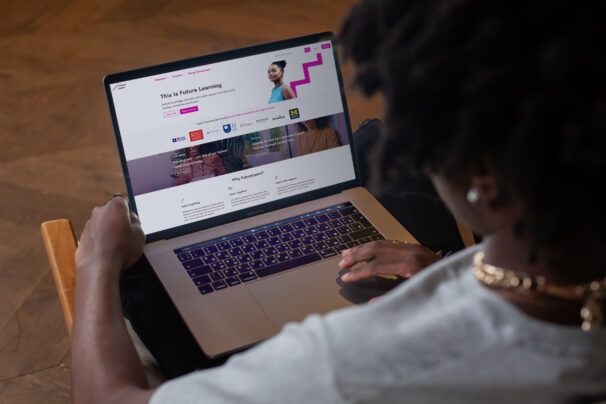Online learning and skills based education come top of class for majority of UK adults and employers

- Online learning platforms ranked as top educational providers for new skills by a third of UK population
- Yet nearly four in five UK adults still perceive barriers to accessing education
- Consumers and employers would most like to see basic finance skills, mental health and practical skills added to the national curriculum
FutureLearn.com – the global learning platform with a mission to transform access to education – launches its second report on The Future of Learning today, exploring key education and learning trends from UK consumers and expert voices across the sector.
The report, which surveyed 2,000 consumers and more than 500 employers of all ages and backgrounds across the nation, breaks down attitudes towards the education and learning system now, a post-pandemic view of how and what people hope to learn in the future, and the skills both professionals and employers are prioritising for the future economy.
ONLINE LEARNING IS HERE TO STAY
A major finding of the report is that online learning is the preferred way for people to build their skills today, with a third (33%) of respondents choosing an online learning platform as the number one provider they’re most likely to go to in order to learn new skills.
Universities are ranked as the fourth top preference with 21% of respondents choosing this. It was preceded by colleges (28%) and accredited training from a brand or tech company (22%).
Online short courses are also the top answer for those considering learning new skills to further their career, with 31% of respondents choosing this. Additionally, almost one in five respondents (19%) have changed their career since the pandemic, and for those who took an online course, 81% said that this helped them achieve the change.
Experts also commented on why online learning remains popular, with Professor Kiran Trehan, Pro-Vice-Chancellor for Partnerships and Engagement and Director of the Centre for Women’s Enterprise, Leadership, Economy and Diversity, University of York, stating: “A one-size-fits-all approach doesn’t fit with all of our aspirations anymore. We like the idea of being able to learn when we want, how we want, in different spaces – reflecting the changing nature of work.”
Andy Hancock, CEO of FutureLearn, said: “The future of learning is, for the most part, already upon us and this year’s Report shows that online learning has been cemented as an essential part of it for learners, educators and employers alike. As the sector moves forward, it’s more important than ever that we use the insights gained to deliver high-value courses, resources and learning experiences that can take each learner along their lifelong learning path and towards success.”
BARRIERS TO ACCESS STILL EXIST IN EDUCATION
While online learning has become an increasingly popular way to widen access to quality education, the report also explores the barriers to education perceived by UK adults. In fact, the report has found that nearly four in five (79%) suggest there is at least one factor that could make the learning process more difficult.
The top three factors that most perceive to have a negative impact on individuals throughout their education are: disability and socioeconomic background, with a third (33%) of respondents choosing both, closely followed by appearance (32%). Personal appearance and race are also perceived issues according to 32% and 29% of respondents respectively.
Yvonne Chien, Chief Growth Officer at FutureLearn, commented: “While much has been achieved in terms of opening up learning opportunities to more people globally, we as a sector still have some way to go towards truly democratising education. Online learning can be an incredibly powerful tool to help overcome some of these barriers that our report has highlighted. FutureLearn’s mission is to transform access to education, and we’re proud to do just that by creating an open, dynamic and social environment where millions of learners in the world can come together to share perspectives, gain knowledge and learn new skills, regardless of their situation or background.”
HIGH DEMAND FOR LIFE SKILLS AND MICROCREDENTIALS
The Future of Learning 2022 Report asks both consumers and employers which skills, if any, they feel are missing from the national curriculum and has found that life skills are most desirable.
The top three skills that both consumers and employers want to see on the curriculum are:
- Finance management for everyday life (39% of consumers and 40% of employers)
- Mental health (39% of consumers and 35% of employers)
- Practical skills such as building, woodwork and electrics (28% of consumers and 30% of employers)
In terms of formal qualifications, the Report has uncovered a similar shift in attitude towards more practical and applied accreditations and microcredentials with both consumers and employers alike.
Microcredentials are cited as one of the top three education-specific qualifications employers look for on their ideal candidate’s CV (14%), alongside skills-based qualifications such as BTECs and T-Levels (26%) at number one and grades from school (22%) at number two. The growth in popularity of Microcredentials is supported by an increasing number of institutes like The Open University, Deakin University, The University of Glasgow and others partnering with FutureLearn to develop over 50 of these stackable accreditations since their launch in 2020, across subjects such as sustainability and teaching, to healthcare and business & management.
Consumers are largely aligned with these expectations around the type of education they believe would land them the job they want, with one in five (20%) choosing Vocational courses and apprenticeships as the number one route, followed by skills-based qualifications (18%) and a combination of degree and short courses (17%).
Download a full copy of The Future of Learning 2022 report here.
Notes to Editor
The research was conducted by Censuswide with 2,000 Nat Rep UK respondents between 24.12.21- 04.01.22 and 500 Employers in the UK between 24.12.21 – 30.12.21. Censuswide abide by and employ members of the Market Research Society which is based on the ESOMAR principles.
About FutureLearn
FutureLearn is a global learning platform with a mission to transform access to education by offering top online courses from the world’s leading universities and brands. From microcredentials and degrees to ExpertTracks and short courses, FutureLearn offers accredited and unaccredited world-class education that is 100% online, on-demand, and social. Founded in 2012 by The Open University, FutureLearn has built a global network of over 18 million learners, hosted over 5,000 online courses, and partnered with more than 250 top universities, leading global brands, and government departments – such as the University of Cambridge, the University of Glasgow, Deakin University, Samsung and Health Education England. The wide-ranging courses available allow learners to expand their interests, unlock highly skilled new career paths, and help change the world.


